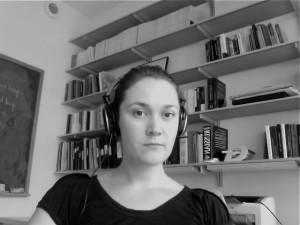Events

- This event has passed.
Maria Gouskova: “Vug, vg-a: An Experimental Investigation of Russian Yer Deletion”
April 8, 2011 @ 3:30 pm - 5:00 pm | Stevenson Fireside Lounge
 Russian has a well-known rule called yer deletion: stem mid vowels are deleted when a vowel-initial suffix follows (as in [rov] `ditch (nom sg)’ vs. [rv-a] (gen sg)). The rule is lexically idiosyncratic: most mid vowels in identical contexts do not alternate (as in [rʲov] `howl (nom sg)’ vs. [rʲov-a] (gen sg)). There are two types of approaches to such alternations. I will advocate a theory in which entire morphemes are labeled in the lexicon as subject to this alternation, and the phonological grammar is responsible for deriving generalizations about where deletion is possible or blocked (Gouskova to appear, cf. Yearley 1995). A much better known alternative theory holds that the alternating vowels must be labeled on a segment-by-segment basis, and that the conditioning environment for deletion is opaque: yers are realized when followed by abstract yers in the UR but delete otherwise (Lightner 1972, Pesetsky 1979, Kenstowicz and Rubach 1987, Halle and Matushansky 2006). These theories make different predictions for how speakers might extend the alternation to novel forms. The goal of this talk is to demonstrate that speakers are aware of the phonological generalizations that govern the alternations.
Russian has a well-known rule called yer deletion: stem mid vowels are deleted when a vowel-initial suffix follows (as in [rov] `ditch (nom sg)’ vs. [rv-a] (gen sg)). The rule is lexically idiosyncratic: most mid vowels in identical contexts do not alternate (as in [rʲov] `howl (nom sg)’ vs. [rʲov-a] (gen sg)). There are two types of approaches to such alternations. I will advocate a theory in which entire morphemes are labeled in the lexicon as subject to this alternation, and the phonological grammar is responsible for deriving generalizations about where deletion is possible or blocked (Gouskova to appear, cf. Yearley 1995). A much better known alternative theory holds that the alternating vowels must be labeled on a segment-by-segment basis, and that the conditioning environment for deletion is opaque: yers are realized when followed by abstract yers in the UR but delete otherwise (Lightner 1972, Pesetsky 1979, Kenstowicz and Rubach 1987, Halle and Matushansky 2006). These theories make different predictions for how speakers might extend the alternation to novel forms. The goal of this talk is to demonstrate that speakers are aware of the phonological generalizations that govern the alternations.
Even though vowel-zero alternations in Russian are lexically idiosyncratic, the identity of alternating vowels is partially predictable: only mid vowels can alternate, and there are certain phonological contexts where alternations are predictably blocked. This talk reports on two experiments that asked Russian speakers to rate pairs of inflected words in which a vowel was deleted. The results show that the rating strongly correlates with the quality of the vowel: deletion of mid vowels (as in [xel] and [xl-a]) was rated higher than deletion of high and low vowels (e.g., [gil] and [gl-a] or [ʃap] and [ʃp-a]). An experiment also tested context effects: deletion that creates a medial CCC cluster that violates sonority sequencing, deletion of vowels in different stress contexts, and deletion in CVCC stems. These results suggest that speakers have a grammar even for this non-productive and lexically limited alternation.
This talk is presented as part of the Linguistics Colloquium Series.
